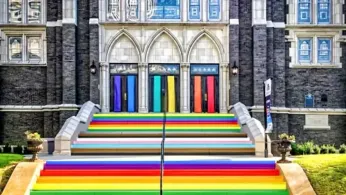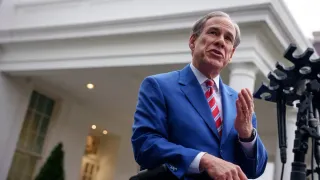
5 hours ago
Dallas Church Paints Rainbow Staircase in Defiant Response to Texas Governor’s LGBTQ+ Crosswalk Ban
READ TIME: 4 MIN.
On a bustling corner in Dallas’s Oak Lawn neighborhood, the steps leading up to Oak Lawn United Methodist Church now beam in the vibrant colors of the rainbow and the transgender pride flag—a striking new landmark that stands in direct response to a recent statewide crackdown on LGBTQ+ symbols in public spaces. This bold act was inspired by Texas Governor Greg Abbott’s directive that all Texas cities must remove “political symbols” from roadways, specifically targeting the rainbow crosswalks that have symbolized LGBTQ+ affirmation across cities like Dallas, Houston, and Austin for years .
Governor Abbott’s order, issued earlier this month, requires the removal of all “symbols, flags, or other markings” on Texas roadways that represent social, political, or ideological messages. The order specifically targeted rainbow crosswalks, which have served as visible affirmations of LGBTQ+ pride and inclusivity since their installation—often through private donations—in neighborhoods with significant LGBTQ+ populations .
The directive has been met with a wave of protest and frustration, particularly in Dallas’s Oak Lawn neighborhood—a historic hub of LGBTQ+ culture, activism, and community life. In Houston’s Montrose district, demolition crews removed a rainbow crosswalk under significant protest, leading some residents to quickly chalk makeshift rainbows in its place. Meanwhile, in Dallas, local officials and advocates have rallied in defense of the neighborhood’s iconic rainbow crosswalk, with city council member Chad West urging constituents to contact city leaders and legislators to fight for its preservation .
In this charged atmosphere, Oak Lawn United Methodist Church, a Dallas institution since 1874, announced via social media that it would be painting its front steps in rainbow colors as an act of solidarity and resistance. The church’s leadership and congregation quickly mobilized, transforming the entrance into a bold statement of affirmation for the neighborhood’s large LGBTQ+ population .
Senior Pastor Rachel Griffin-Allison explained the decision: “All of this is really so much more about showing love to the people than it is about response to the governor… If crosswalks are being erased, I want everyone who passes by here on a daily basis to know that you are not being erased” . She further emphasized in an interview, “Silence in the face of harm always sides with the oppressor. The church needs to show up boldly, with wide-open doors, to make sure that we provide space for the queer community so that they have sanctuary, that protection, when the world doesn’t feel safe around them” .
Robert Garcia Sr. and Robert Garcia Jr., father and son and heads of security at Oak Lawn United Methodist Church, have been instrumental in the painting project. “We’re trying to show them you can take away the colors here, but you can’t take it away from our church,” said Garcia Jr. . The church, he said, has always been a place where “you come in here and you’re family—gay, straight, trans, Black, white. There are hugs everywhere…open doors” .
The painting of the stairs has sparked a wave of positive reactions both locally and online. Passersby honked and waved in support, and many community members approached church staff to express how much the visible display of pride and solidarity meant to them. “The community response has been a love fest,” said Pastor Griffin-Allison. “These steps are really our prayer of sacred resistance. They’re not just paint on steps, but a way to say that God’s love will not be silenced” .
Oak Lawn United Methodist Church has a history of supporting the LGBTQ+ community. In the 1980s, it began its outreach by distributing water to participants in the Dallas Pride Parade. During the height of the AIDS crisis, the church held funerals for those who died when others would not. Today, it continues to offer sanctuary and visible affirmation, with plans to turn two of the front landings into spaces for community murals co-created with local residents .
The Oak Lawn church’s action is part of a larger pattern of resistance across Texas. In Houston, after the removal of the Montrose rainbow crosswalk, residents immediately chalked rainbow colors in its place. In Austin, drag artist and activist Brigitte Bandit and others staged a photoshoot on their own crosswalk, even as protesters attempted to deface it. These acts of public affirmation reflect a broader movement among Texas’s LGBTQ+ communities and allies to resist erasure and assert their right to visibility, safety, and pride .
Advocates argue that the removal of these symbols threatens not only LGBTQ+ visibility but also the message of inclusion and safety that such markers provide, especially in historic queer neighborhoods. While Governor Abbott’s administration maintains that public roadways should remain “neutral” and that taxpayer dollars should not fund political messages—though many rainbow crosswalks were installed using private funds—the debate over these symbols has galvanized both protest and creative displays of solidarity statewide .
For many LGBTQ+ Texans, the removal of rainbow crosswalks and other public symbols of pride represents a broader struggle for visibility and safety. Cece Cox, CEO of Dallas’s Resource Center, and out State Representative Venton Jones helped lead a rally at the intersection of Cedar Springs and Oak Lawn in defense of the rainbow crosswalk, highlighting the importance of community action in times of official retrenchment .
For Oak Lawn United Methodist Church and its supporters, the newly painted steps are more than a protest; they are a declaration that LGBTQ+ people and their allies remain a visible, valued part of Texas’s cultural and spiritual landscape. As Rev. Griffin-Allison put it: “The governor may remove a rainbow from a roadway—but he cannot erase the image of God in God’s people… We see this as a way to show that love belongs in public” .
Oak Lawn United Methodist Church has announced plans for ongoing public art projects, including community murals, to further affirm its commitment to inclusion and belonging. As the church continues its long tradition of LGBTQ+ outreach and sanctuary, its rainbow steps are already serving as a beacon of hope, resilience, and public love in the heart of Dallas .






